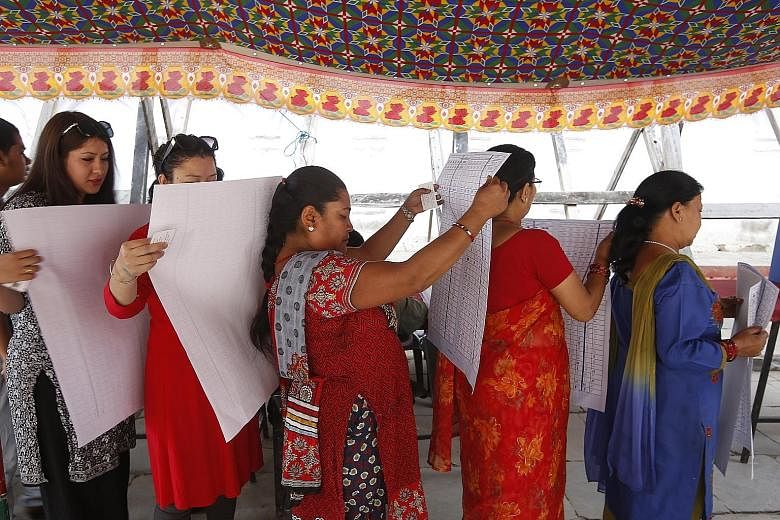KATHMANDU • Voting began yesterday in Nepal's first local elections for two decades, a landmark moment in the country's fraught transition to democracy.
Polls opened in three provinces at 7am, with nearly 50,000 candidates vying for the position of mayor, deputy mayor, ward chairman and ward member in 283 local municipalities.
With nearly 70 per cent of the population aged under 35, many are electing their local representatives for the first time.
The local representatives were last elected in 1997 and their five-year terms expired at the height of the brutal Maoist insurgency.
The 10-year war ended in 2006 and the country began a rocky transition from a Hindu monarchy to a secular federal republic, which has seen it cycle through nine governments. The long gap between polls has left an institutional void at local level, which has seen graft become a way of life in Nepal, hampering the delivery of basic services as well as the recovery from a devastating 2015 earthquake.
Long queues started to form early outside polling stations in the capital Kathmandu, with many eager voters sheltering under umbrellas from the harsh sun.
The ballot paper in the capital - one of the largest constituencies - was around 1m long with the names of the 878 candidates.
"It is difficult to expect much from our politicians - they have always been selfish and not worked for the people - but I hope that, with this election, things will change," housewife Shova Maharjan, 41, told AFP after casting her vote in the capital.
While the youth vote is seen as key in undermining the grip of the three main political parties, the elderly were also out in force.
Among them was a 105-year-old man, who cast his ballot in Gorkha, the epicentre of the devastating 2015 earthquake, according to the election commission.
Many independent candidates are standing for seats, while a number of small reformist parties are also expected to grab some votes from the traditional political heavyweights.
The vote has been split into two phases because of unrest in the southern plains bordering India, where the minority Madhesi ethnic group is refusing to take part until an amendment to the Constitution is passed.
The remaining four provinces, considered potential flashpoints for election-related violence, will vote in the second phase on June 14.
But, with results expected from yesterday's vote later this week, observers have expressed concern that the first phase will influence the outcome of the second.
As part of the deal that ended the civil war, a new Constitution was written and finally adopted in September 2015, nearly a decade after the end of the conflict.
The charter mandated that local elections, followed by provincial and then national elections, be held by January 2018 - the final step in the drawn-out peace process.
AGENCE FRANCE-PRESSE

